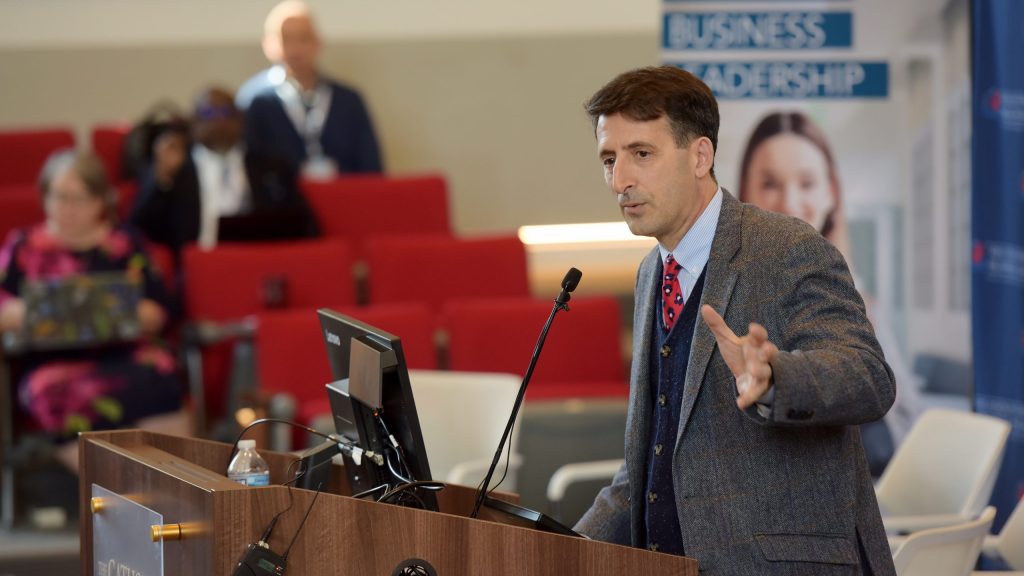Faith-oriented employee resource groups, or ERGs, have been established at some major corporations for as many as 20 years.
They allow employees to meet as Christians, Jews and Muslims, Hindus, Buddhists and members of other faiths, not to segregate themselves, but to allow better communication with other employees and as a way of encouraging common values.
A Feb. 13-14 conference at The Catholic University of America in Washington was aimed at helping promote ERGs nationwide. One of the first of its kind, the conference was attended by over 150 business leaders and human resources professionals.
Admittedly, the concept, outside of a specialized audience focusing primarily on middle management supervisors, can sound a little vague. It also could be misunderstood as proselytizing, or as a front for forms of political activity.
But conference speakers said that's not how it works. Instead, they said, it's a way of promoting ethical behavior, and from that, decisions that focus on employee well-being in addition to the pursuit of corporate profits.
It also means recognizing the need for workplace chaplains, and understanding workplace discrimination laws. ERGs are meant give religious faith on the same workplace standing in anti-discrimination policies as ethnicity, sexual orientation, age, and military status.
In January, the Religious Freedom & Business Foundation, a sponsor of the conference, released a new measurement of achievement called the Corporate Religious Equity, Diversity and Inclusion Index, or the REDI Index. Topping the list, among Fortune 100 companies, was Google, followed by Intel, Tyson Foods, Target, American Airlines and Facebook. Google's ERG is called the Inter Belief Network.
ERGs means all faiths receive equal respect in the workplace, and not only by respecting all religious holidays and providing prayer and meditation spaces. The groups also provide a way for employees of all faiths to come together to mourn and offer assistance after tragedies such as the Tree of Life Synagogue shooting in Pittsburgh in 2018.
It's what Andrew V. Abela, dean of the Busch School of Business at Catholic University of America, called "virtuous business."
"What does it take to fully bring your faith to work?" he asked in his keynote address. He cited a Second Vatican Council document criticizing those "who think that religion is an act of worship alone."
Dividing faith and work carries "the implicit assumption that being effective at work and being religious are not connected," he added.
Virtues, he explained, "fit with our human nature. The idea is that God has made us a certain way" and "means that there are certain behaviors that work for us as human beings."
The cardinal virtues of prudence, justice, fortitude and temperance put into practice means that "over the long term, what we could call virtuous behavior also tends to be prosperous behavior."
In a statement issued ahead of the conference, Abela noted that "the religious dimension is an essential part of human life, and any vibrant business ought to welcome and support this dimension. At the Busch School of Business, we teach that faith and business aren't mutually exclusive. Employees should not have to check their beliefs at the door."
Conference speaker Sue Warnke, president of Faithforce San Francisco, said of an ERG: "It's not just good for business, which it is, it's good for humanity." She called the groups "an antidote for divisiveness." Faithforce is the interfaith ERG of Salesforce, where Warnke is senior director of content and communication experience.
Ellen Barker, a senior vice president and chief information officer at Texas Instruments, said workplace religious diversity "promotes respect, trust and meaningful connections. Because we can bring our faith to work."
When Texas Instruments began its groups in 2000, "people didn't talk about their spiritual journey," she added. For many of our employees, faith forms their core values and their identity. Why not let them bring that into the workplace?"
Barker also said ERGs have become an essential recruiting tool. She said she has found that millennials "want to live out their purpose."

